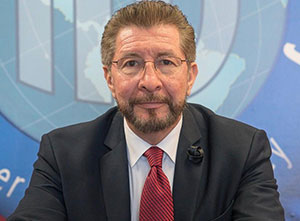The fight against narcotics trafficking fails only when the narcos take political power

By: Carlos Sánchez Berzaín - 14/04/2025
Share:
One of the most persistent narratives of 21st Century Socialism is the failure of the fight against narcotics trafficking, a fallacy aimed at legitimizing its criminal activities. Objective reality proves that the fight against narcotics trafficking fails only when the Narcos take political power and establish protective mechanisms for their illicit activities or install narco-States. In democracy, the fight against narcotics trafficking is successful and indispensable, as part of the rule of law.
Trafficking in narcotics is a criminal activity as indicated by the 1961 Sole Convention Against Hallucinogens, amended by the 1972 Protocol, Convention on Psychotropic Substances of 1971, the United Nations’ Convention Against the Illicit Traffic of Hallucinogens and Psychotropic Substances of 1988, the 2000 United Nations Convention Against Transnational Organized Crime, or Palermo Convention, and more.
In 1982, Colombian narcotics trafficker Pablo Escobar Gaviria was able to be selected as “member of the Colombian National Congress” a position he lost in 1983 due to accusations levied against him by Colombia’s Minister of Justice Rodrigo Lara Bonilla, and publications on the El Espectador newspaper. Both; Lara Bonilla and Guillermo Cano Director of El Espectador, were assassinated.
In the decade of 1980, Pablo Escobar and Bolivian Roberto Suarez entered into a partnership with Fidel Castro turning Cuba into the first narco-State of the Americas, a situation that led to “Cause Nr. 1/89” that resulted in “the execution by a firing squad of General Arnaldo Ochoa Sanchez, Colonel Antonio de la Guardia Font, Major Amado Padron, and Captain Jorge Martinez Valdes.” In a book titled “The King of Cocaine,” Aida Levy -wife of Roberto Suarez- points to Fidel Castro as responsible for the execution as “an attempt to cleanse his stained image” and that he also “assassinated, imprisoned, tortured, and deceived his closest collaborators whose sole crime was to have carried out the orders they received from him and his brother Raul.”
In 1992, Panama’s former dictator Manuel Antonio Noriega was tried in the United States and sentenced to 40 years in prison for narcotics’ trafficking (his sentence was later reduced to 30 years, and he finally ended-up serving only 17 years, thanks to his good behavior).
In the decade of 1990, the fight against narcotics trafficking was part of the consensus of the First Summit of the Americas of 1994 and was successful in the region. In Bolivia from 1994 to 2003, as part of State policy, illicit coca harvesting was reduced from 172,974 acres to 7,413 acres and through agreements with the United States Drug Enforcement Agency (DEA) and extradition treaties, the country was no longer narcotics’ oriented. In Colombia, through the so-called “Process 8,000” President Ernesto Samper was accused to have been funded by narcotics’ traffickers. During the presidency of Andres Pastrana, the foundation was laid out for Plan Colombia that was successfully applied by President Alvaro Uribe with serious setbacks with Juan Manuel Santos.
On matters pertaining to narcotics trafficking, 21st Century Socialism operates under the premise established by Fidel Castro in the decade of 1960 that identified “narcotics’ trafficking as an instrument of the antiimperialist fight” against the United States, with an open and on-going campaign to highlight “the failure of the war on drugs” always seeking the decriminalization of drugs, mainly cocaine.”
They have turned Cuba, Venezuela, Bolivia, and Nicaragua into narco-States of 21st Century Socialism with the formation of the “Cartel of los Soles” as one of its main features, with Nicolas Maduro and Diosdado Cabello with bounties of $25 million dollars each for their capture. Bolivia with Evo Morales has made the illicit coca leaf harvester federations into the political party Movement Towards Socialism (MAS in Spanish). Ships that departed from the port of Mariel in Cuba, have been intercepted in Panama with loads of cocaine. Ecuador, turned into a narco-State by Rafael Correa, still suffers the consequences of narcotics’ trafficking.
In 2011, Evo Morales’ former anti-narcotics director, General Rene Sanabria, was sentenced to 14 years in jail in the United States. In June of 2024, the former president of Honduras Juan Orlando Hernandez, was sentenced for narcotics’ trafficking to 45 years in jail in the United States. In December of 2024, Colonel Maximiliano Davila, last Director of the Special Force For the Fight Against Narcotics Trafficking (FELCN in Spanish) was extradited to the United States for narcotics’ trafficking.
Countries where the fight against narcotics’ trafficking fails are those wherein the governments are influenced, penetrated, controlled by, or are part of narcotics’ trafficking networks. Starting with the expulsion of the DEA, from countries controlled by 21st Century Socialism, to the requests “to legalize cocaine” by their para-dictatorial governments, to the implementation of programs such as Lopez Obrador’s “hugs for not thugs” (Abrazos y no balazos in Spanish) in Mexico, to the direct or indirect sustainment of narcotics’ trafficking by governments and political operators, all make it impossible to get good results against crime.
The most recent event happened at a meeting between the Secretary of U.S. Homeland Security and the President of Colombia in which, Gustavo Petro defended criminal organizations stating “they are persons in need of greater love and understanding.”
*Attorney & Political Scientist. Director of the Interamerican Institute for Democracy.
Translation from Spanish by Edgar L. Terrazas
«The opinions published herein are the sole responsibility of its author».